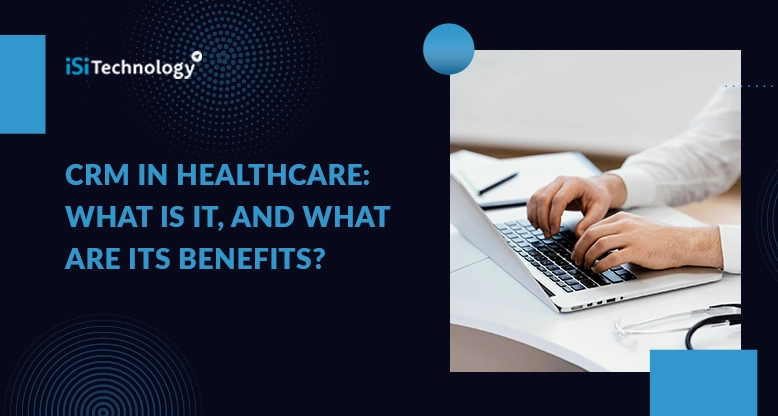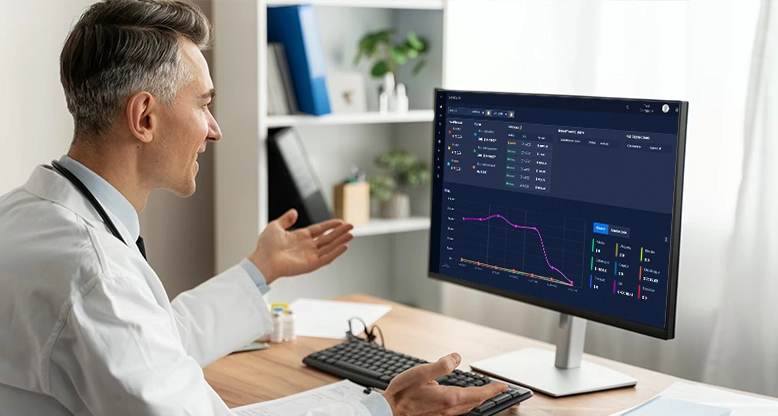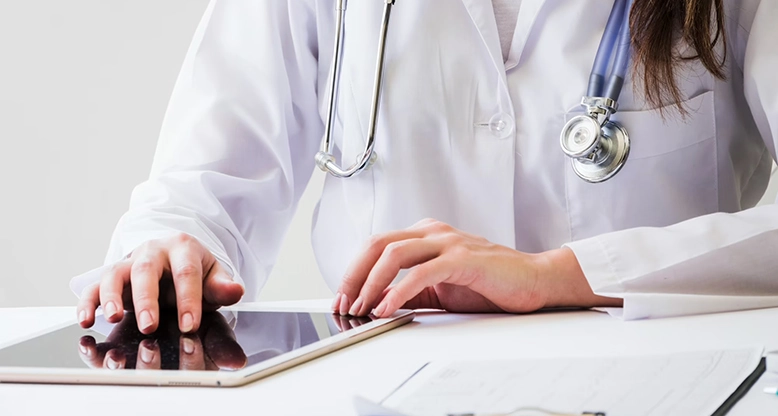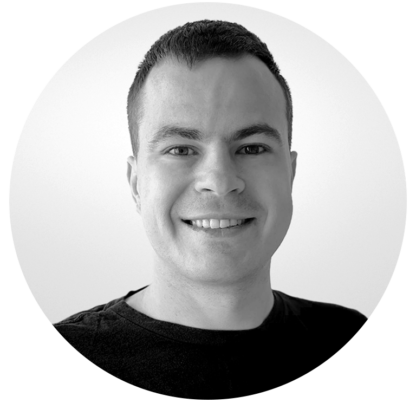CRM in Healthcare: What is It, and What are Its Benefits?

Is there room for customer relationship management (CRM) in healthcare?
CRM is crucial for many businesses and services, and healthcare is one of them. CRM isn’t just a strategy to get more clients, although it is a significant benefit. It is also a system that helps healthcare companies provide the best possible service to people in need.
Beyond the financial benefits to businesses, CRM will do wonders for crucial processes involved in healthcare. After all, medical services are largely about quality of life. And service providers must do the best they can to provide exceptional services for their patients.
What is a Healthcare CRM?
CRM is software that keeps track of and manages a company’s interactions and relationships with its customers. It benefits almost every department, from sales to marketing, and especially customer service.
CRM for healthcare integrates all services a patient receives and needs so that healthcare providers have a holistic understanding of their health demands. Robust software in healthcare is very important because patients require different services throughout their lifetimes. Tracking their individual health journeys is crucial for their care.
The Role of CRM in Modern Healthcare
Healthcare is quite complicated because a person may need different medical services, which are handled by various departments within healthcare facilities. And unfortunately, not all treatments and medications work together.
CRM in the healthcare industry will ensure that all treatments, medications, and services a patient will benefit them.
Comprehensive patient management
CRM provides an overview of a patient’s overall healthcare. It includes the following:
- Medical history
- Appointments
- Prescriptions
Every time the patient receives medical treatment or service, it will be in their record. So, even if a different doctor takes care of them on their next visit, they will have access to all the information they need to continue proper treatment.
This record will prevent the physician from prescribing medication the patient may be allergic to. And if a patient is experiencing new symptoms, they could easily determine if it is related to previous conditions or medications.
The system also determines when the patient is supposed to have their next medical appointment. The facility could set up an automatic reminder or assign staff to message patients about this schedule.
Collaboration from different departments
Some patients require procedures that would affect other parts of the body. For example, a patient with heart disease needs hip replacement surgery. The patient’s cardiologist must approve the surgery because it also affects the heart.
With CRM, communication between departments is a breeze. The system could easily flag the cardiologist for recommendation or approval.
Healthcare professionals may also need reminders to generate important reports that would affect other departments. CRM in healthcare will ensure that these are completed on time.
Various departments can collaborate seamlessly with CRM instead of overlapping services. It will minimize lapses where there was no indication that a needed service was already completed.
The system encourages multi-department sharing of information that could only benefit the patients.
Reporting and analytics
Reporting data for every consultation or procedure will help in healthcare analytics. It is the process of collecting data so the healthcare facility can provide actionable insight into the patient’s health.
Healthcare analytics is the perfect demonstration of the pressing question: what does CRM mean in healthcare? It means a patient gets the best medical care they need and deserve.
Without analytics, it can be time-consuming for healthcare providers to consult with each other individually. The diagnosis or treatment plan will take a long time to be developed, or the patient will be forced to undergo haphazard health management.
But with reporting and analytics, the system will create a comprehensive plan based on the reports from medical experts. This seamless workflow will benefit patients and healthcare providers.
The system also addresses the issue of nursing shortage and overworked healthcare workers. Automation and improved operations will remove a significant load off their shoulders.
Billing
CRM will also simplify the billing system. Because all relevant information is already accurately and thoroughly recorded in the system, billing staff can just access data to bill clients.
Billing will be automated for insurance providers, too. It’s less work for all stakeholders concerned.
Medical billing software will also reduce or eliminate mistakes in billing. And if mistakes are made, it is quite easy to correct them.
Medical transportation
CRM for medical transportation is also crucial in the healthcare industry. The industry employs various transportation services:
- Ambulances
- Medical couriers
- Non-emergency medical transportation (NEMT)
With CRM, the organization can efficiently facilitate trips without overlap or lag. The trips are reported in the system or NEMT software, and it will provide the best route for the drivers to take. Emergency vehicles and NEMT can avoid traffic, and the system will ensure absences of drivers are immediately covered.
Key Benefits of CRM for Healthcare Providers

What is a CRM in healthcare? It is convenience, efficiency, and improved services all rolled into one platform.
Here are the key benefits of such a system:
Eliminates paperwork
Manual paperwork slows down the healthcare process. Personnel have to print forms, get them filled out and signed, photocopied, and passed around from one person to another. There is also a higher risk of mistakes with manual processes.
CRM requires very minimal paperwork. The process is much faster, and errors are significantly reduced.
Better communication
CRM improves communication internally and externally.
Organizations have a centralized platform accessible to all or essential members. It makes collaboration a breeze. Most systems have a task organizer where staff can keep track of their responsibilities. They can tick off what has already been accomplished and be aware of those that have yet to be completed, along with their deadlines.
Most CRM platforms also ensure better communication with patients. A robust patient portal will have all of their test results, diagnoses, and upcoming appointments or pending checkups.
Improved customer experience
The ease of communication is one crucial way that CRM can improve customer experience. Patients can easily access their data, so they can track their health status and know when it’s time for another consultation.
Scheduling is easy, too, since they only need to go to the platform and check available slots. There is no need to call and wait for staff to get back to them with preferred appointment dates.
Patients can also track their billing in real time through CRM. This is a crucial element in the overall healthcare experience.
Customer support
The ideal CRM provides 24/7 customer service. It is vital for all stakeholders involved: healthcare professionals and staff, third-party service providers, and patients.
Among the biggest software trends is the chatbot. It provides assistance for those who don’t have emergency ailments to get basic medical advice.
Enhance administrative work
Healthcare personnel no longer need to go through multiple documents to accomplish a single medical report or bill. It’s just a matter of pulling out the right information and systematizing the workflow.
It can be difficult to manually monitor daily, weekly, and monthly admin responsibilities. But with CRM and medical software, everything is on one platform and easy to access.
Better marketing campaigns
CRM in healthcare provides raw data and successful healthcare measures that can be used in marketing campaigns. Competition is stiff in the industry. Healthcare organizations want to stay on top of the game, and software can help them create valuable, effective campaigns based on truth.
What are the Most Important Features of CRM Software?

Automated workflow
One of the most important benefits of CRM is a more efficient workflow. The software must automatically report tasks that have been completed so the next layer of service can proceed without delay.
All users in the workflow channel will see tasks done in real-time, so they know when they should come in with their specific responsibilities. Those who still need to do their part must be notified immediately.
Customization
Healthcare facilities have varying work processes. The CRM software must be customizable so it can cater to the business’s unique needs.
Some software providers allow businesses to install plugins to improve and personalize CRM capabilities.
Integration
It should be possible to integrate other third-party solutions into the CRM. For example, billing and coding software and backup storage services for medical documents are some of the most critical tools for daily operations.
Customer service
Ideally, customer support must be available 24/7, with multiple channels: chat, email, and phone.
Analytics
CRM analytics can provide insight into customer data that can help improve patient care. Analytics will also help businesses introduce new products and services that patients need and want.
Case Study: Real-world Example of CRM in Healthcare
What are the practical outcomes of CRM delevopment for healthcare? Trinity Health, one of the largest non-profit and faith-based healthcare organizations, earned $16.4 million in profit because of CRM technology. It leveraged patient-focused marketing campaigns for client acquisition, which increased its revenue.
Sharing successful medical approaches with potential customers can help increase patient acquisition. So, Trinity Health’s major success lies in expanding its patient base.
Automation also helps increase profits. Healthcare organizations don’t have to maintain a full staff because much admin work is done by the system. Tasks are completed more quickly, which means productivity is increased in the process.
The patient database also provides another marketing opportunity as the organization can target current patients for new healthcare products and services. A good healthcare experience will lead patients to recommend the facility to family and friends.
Conclusion
Every industry needs software that will make services more efficient and benefit everyone concerned: those within the organization and their clients.
When it comes to CRM in healthcare industry, ISI Technology delivers software that solves problems. Technology and innovation have always been about solving issues and simplifying processes.
The same can be said with ISI Technology products like Claimgenix and BillPRO, which are essential insurance billing software. RouteGenie is NEMT software that makes medical transportation dispatch more efficient.
Get a free demo from ISI Technology for your software needs within the healthcare realm.
